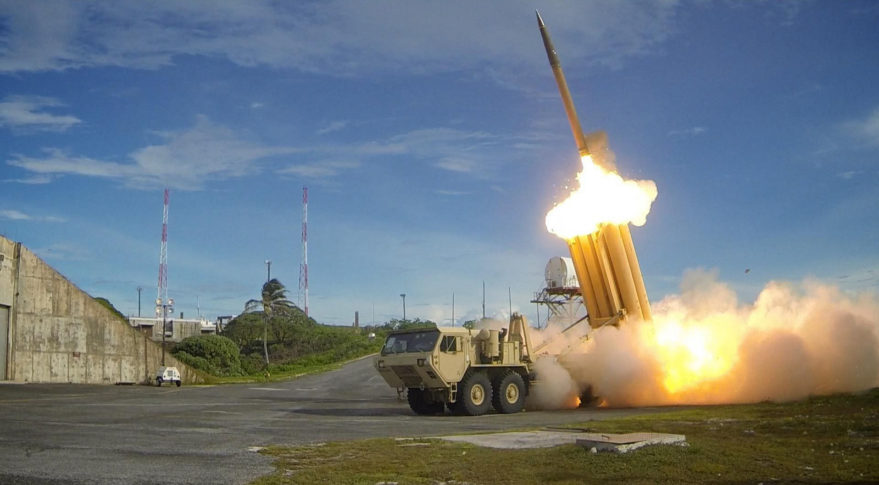US Army 'Space Week' to Shine Light on Why Soldiers Care About Satellites

WASHINGTON — It may come as a shock to many that space is a big deal for the U.S. Army. Though most of its work is done on the ground, more than 70 percent of the Army's major weapons and equipment need satellites to function.
To push this message, Army leaders designated Nov. 27 – Dec. 1 as "space week" with a dual focus on what the Army needs and does in space.
About 2,220 active-duty soldiers, reservists and civilians make up the "space forces" under the U.S. Army Space and Missile Defense Command/Army Forces Strategic Command at Redstone Arsenal, Alabama. The commander, Lt. Gen. James Dickinson, is "dual hatted," reporting both to the chief of staff of the Army and the chief of U.S. Strategic Command. [The Most Dangerous Space Weapons Concepts Ever]
Soldiers communicate, navigate, target, find the enemy, predict the weather and protect forces in the field "based on combat and support assets available from space," said Army spokeswoman Lira Frye. Space forces are assigned to five key missions – intelligence, surveillance and reconnaissance; missile warning; environmental monitoring; satellite communications; and positioning, navigation and timing, or PNT.
Frye said Army leaders decided this was a good time to highlight space because activities are growing and the Army wants to attract more officers to the space career field known as Functional Area 40, or FA40. Over the past year, Army space forces supported more than 16 exercises for every geographic combatant command except U.S. Africa Command.
Soldiers are picked for the FA40 career field after a competitive selection process through the "voluntary transfer incentive program," which can occur at the four-year mark of a soldier's career. Besides their technical abilities, soldiers applying for the FA40 are evaluated based on their values and leadership track records. Once designated, FA40 officers attend a space operations officer qualification course.
The timing of space week happens to coincide with the passage of the Fiscal Year 2018 National Defense Authorization Act, which realigns military space responsibilities. Much of this language came from the House version of the bill that sharply criticized the Air Force for not advancing space innovation in the military at a time when adversaries are moving to challenge U.S. dominance of space.
Get the Space.com Newsletter
Breaking space news, the latest updates on rocket launches, skywatching events and more!
The NDAA directs the Pentagon to accelerate the modernization of space systems and calls for an independent study on whether a distinct "space corps" should be created within the Department of the Air Force. The congressional debate has energized critics who blame the Air Force for under-funding space programs and for lethargic modernization.
Army leaders have not publicly weighed in on the more controversial reforms pushed forth by the NDAA, including the elimination of offices within the Air Force that deal with space and the transfer of responsibilities from the secretary to the Air Force Space Command.
The head of U.S. Strategic Command, Air Force Gen. John Hyten, said the House framed the "problem statement exactly right," but there still no clear answer on how to solve it. "My biggest fear is that the department seems to have lost its ability to go fast. And our adversaries are going fast," Hyten said Nov. 18 at the Halifax International Security Forum. He praised Congress for "eliminating broad swaths of bureaucracy" in military space. "That's an amazing statement," he said. "But what's going to replace it? It's up to the department. … Now we can figure out what we have to do," including how to eliminate the "bureaucracy that keeps us from going fast."
Missile defense a top concern
Just days before the Halifax forum, Hyten toured operations centers at Schriever Air Force Base and Peterson Air Force Base and met with Army units there that support missile defense and space missions, according to an Army news release. Hyten was briefed by the Army's 100th Missile Defense Brigade on how it would respond to an intercontinental ballistic missile attack.
One issue that worries Army commanders is having reliable missile-warning data from satellites. With thousands of troops stationed in the Korean Peninsula amid escalating tensions with a North Korean regime that has threatened the United States and its allies, missile warning has become priority one. Analysts have questioned why the Air Force has not started to develop a new generation of missile-warning satellites to supplement the existing SBIRS constellation. Another pressing concern is the security of GPS signals for positioning, navigation and timing, or PNT. The Army is investing in alternative technologies and backup systems as it fears enemies now have technologies that can jam signals and hackers would break into ground networks.
A perpetual headache in military space programs has been the coordination, or lack thereof, between the Air Force which builds the satellites, and the other services that are responsible for acquiring the terminals, antennas and other "user equipment." This affects Army forces in a big way. There are now, for instance, brand-new communications satellites in orbit and fully operational but the procurement of ground equipment is lagging years behind. Some industry analysts believe a consolidated space corps could help bring together the management of satellites, ground systems, base stations, teleports and terminals under one organization. As one industry source told SpaceNews, "The military needs to do better job coordinating those elements under one program management organization."
This story was provided by SpaceNews, dedicated to covering all aspects of the space industry.
Join our Space Forums to keep talking space on the latest missions, night sky and more! And if you have a news tip, correction or comment, let us know at: community@space.com.

Sandra Erwin covers the military and national security beat as a Senior Staff Writer at SpaceNews. Sandra, based in Arlington, Virginia, specializes in Defense Department and Intelligence Community space programs, policy, budgets, technology and the industry that supports this sector. She joined SpaceNews in October 2017. Before coming to SpaceNews, Erwin covered the U.S. military, the Pentagon, Congress and the defense industry for over two decades as editor of the National Defense Industrial Association's National Defense Magazine and Pentagon correspondent for Real Clear Defense.










